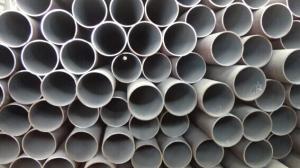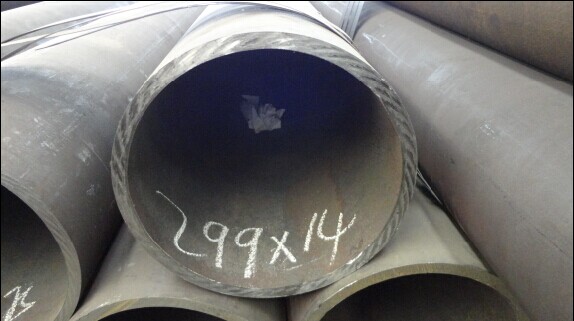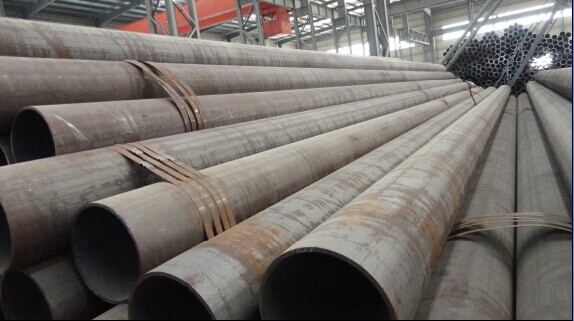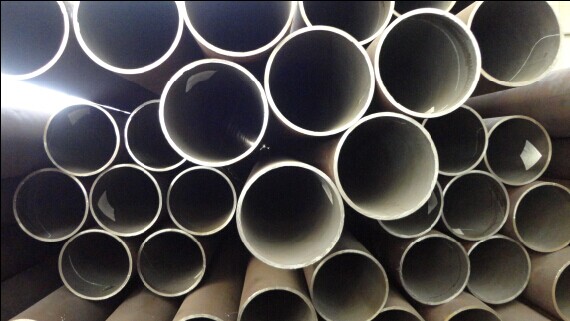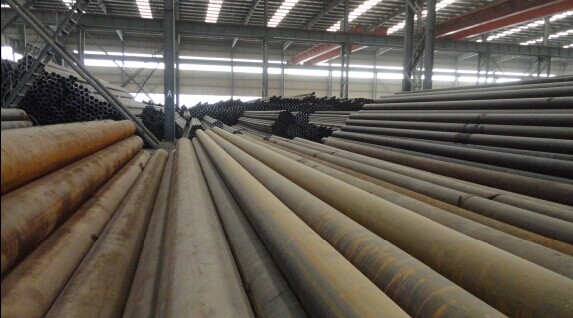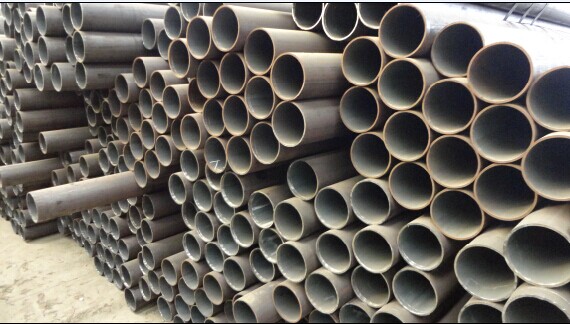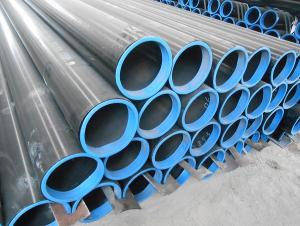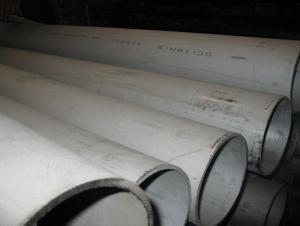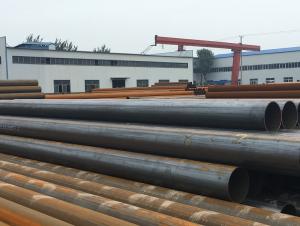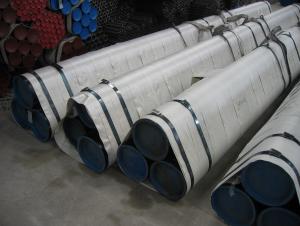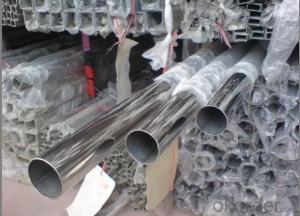Hot Rolled Seamless Steel Pipes Good quality
- Loading Port:
- China Main Port
- Payment Terms:
- TT or LC
- Min Order Qty:
- 30 m.t.
- Supply Capability:
- 12000 m.t./month
OKorder Service Pledge
OKorder Financial Service
You Might Also Like
1、Structure of Seamless Pipe ASTM A106/53:
Seamless pipe is formed by drawing a solid billet over a piercing rod to create the hollow shell. As the manufacturing process does not include any welding, seamless pipes are perceived to be stronger and more reliable. Historically seamless pipe was regarded as withstanding pressure better than other types, and was often more easily available than welded pipe.
Standard: GB/T8162-2008; GB/T8163-2008; GB3087-2008; GB5310-2008; GB9948-2006; ASTM A106/A53 GR.B; API 5L GR.B
Application: Fluid pipes, structural pipes, oil and gas pipes
Packaging: bare/paint, bevelled ends, caps
Material: 20#, Q345B (16Mn)
Outside diameter: 89mm-820mm
Wall thickenss: 4mm-45mm
Application
carbon seamless steel pipes are widely used in gas, water and oil, transpotation;constructions;Bridge,highway,windows of model steel door; building materials;fences;heating facilities Fluid Pipe;conduit pipe,scaffolding pipe.etc.
Payment Terms: L/C D/A D/P T/T
Packing and shipment
Packaged in bundles,as per customers' requirements, it can also bepackagesd as beveled ends, typed marking, black painting, plastic caps protection,woven bags packing
For 20" container the max length is 5.8m; For 40" container the max length is 12m. other options are available based on customer requests. Please discuss when placing orders.
2、Main Features of the Seamless Pipe ASTM A106/53:
• High manufacturing accuracy
• High strength
• Small inertia resistance
• Strong heat dissipation ability
• Good visual effect
• Reasonable price
3、Seamless Pipe ASTM A106/53 Specification:
Standard | GB, DIN, ASTM ASTM A106-2006, ASTM A53-2007 |
Grade | 10#-45#, 16Mn 10#, 20#, 45#, 16Mn |
Thickness | 8 - 33 mm |
Section Shape | Round |
Outer Diameter | 133 - 219 mm |
Place of Origin | Shandong, China (Mainland) |
Secondary Or Not | Non-secondary |
Application | Hydraulic Pipe |
Technique | Cold Drawn |
Certification | API |
Surface Treatment | factory state or painted black |
Special Pipe | API Pipe |
Alloy Or Not | Non-alloy |
Length | 5-12M |
Outer Diameter | 21.3-610mm |
Grade | 20#, 45#, Q345, API J55, API K55, API L80, API N80, API P110, A53B |
Standard | ASME, ASTM |
1) Material:20#(ASTM A 106/A53 GRB.API5LGRB,GB),45#,16Mn,10#.
2) Specification range:OD:21.3-610mm,WT:6-70mm,length:6-12m or according to the requirement of clients.
3) Excutive standards:GB,ASME API5L.ASTM A 106/A53,Despite of the above standards,we can also supply seamless steel pipe with standard of DIN,JIS,and so on,and also develop new products according to the requirements of our clients!
4) Surface:black lacquered,varnish coating or galvanized.
5) Ends:Beveled or square cut,plastic capped,painted.
6) Packing:bundles wrapped with strong steel strip,seaworthy packing.
4、Packaging & Delivery
Packaging Details: | seaworthy package,bundles wrapped with strong steel strip |
Delivery Detail: | 15-30days after received 30%TT |
5、FAQ of Seamless Pipe ASTM A106/53:
①How is the quality of your products?
Our products are manufactured strictly according to national and internaional standard, and we take a test
on every pipe before delivered out. If you want see our quality certifications and all kinds of testing report, please just ask us for it.
Guaranteed: If products’ quality don’t accord to discription as we give or the promise before you place order, we promise 100% refund.
②How about price?
Yes, we are factory and be able to give you lowest price below market one, and we have a policy that “ for saving time and absolutely honest business attitude, we quote as lowest as possible for any customer, and discount can be given according to quantity”,if you like bargain and factory price is not low enough as you think, just don’t waste your time.Please trust the quotation we would give you, it is professional one.
③Why should you chose us?
Chose happens because of quality, then price, We can give you both.Additionally, we can also offer professional products inquiry, products knowledge train(for agents), smooth goods delivery, exellent customer solution proposals.Our service formula: good quality+good price+good service=customer’s trust
SGS test is available, customer inspection before shipping is welcome, third party inspection is no problem.
6、Seamless Pipe ASTM A106/53 Images:
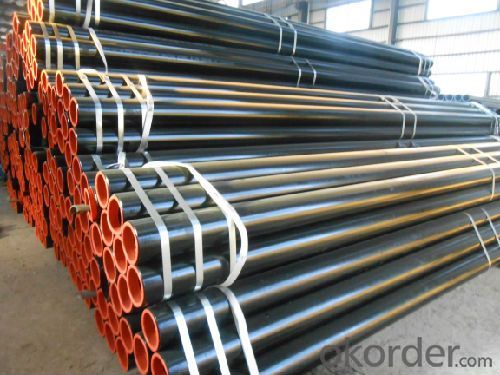
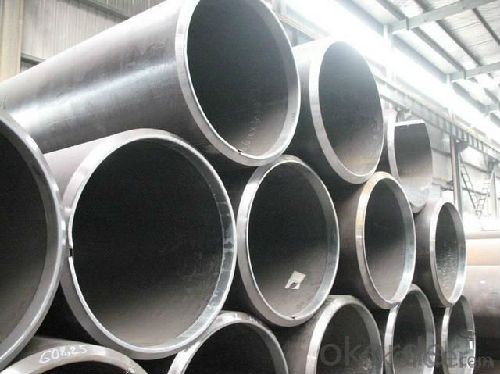
- Q: What are the different types of hangers used for supporting steel pipes?
- Supporting steel pipes requires the use of various hangers, each with its own distinctive design and purpose. Some commonly used types include: 1. Clevis Hangers: These hangers consist of a U-shaped loop that attaches to a support structure using a threaded rod. The pipe is then secured in place with a bolt. Clevis hangers are ideal for vertical pipe runs and provide excellent stability and support. 2. Split Ring Hangers: Designed with a split ring that wraps around the pipe, these hangers can be easily installed and adjusted. They are suitable for different pipe sizes and applications. 3. Pipe Clamps: Simple and versatile, pipe clamps consist of a metal clamp that wraps around the pipe and is secured to a support structure using screws or bolts. They come in various designs to accommodate different pipe sizes and ensure stability. 4. Beam Clamps: These hangers are specifically designed for overhead support beams or structures. They feature a clamp that wraps around the beam and attaches to the pipe using a threaded rod or bolt. Beam clamps are commonly used in industrial and commercial settings for horizontal pipe runs. 5. Roller Hangers: When pipe movement is necessary due to thermal expansion or contraction, roller hangers are used. They allow the pipe to move freely while still providing support, making them suitable for long pipe runs or areas with significant temperature variations. 6. Spring Hangers: Designed to support pipes and absorb vibrations or shocks, spring hangers consist of a spring element attached to a support structure and a rod or rod assembly that supports the pipe. They are often used to reduce noise or prevent damage caused by vibrations. These examples represent just a few of the hangers available for supporting steel pipes. The selection of a hanger depends on factors such as pipe size, weight, location, and specific installation requirements. It is recommended to consult with a professional or engineer to ensure the appropriate hangers are chosen for each specific application.
- Q: How are steel pipes used in the agricultural sector?
- Steel pipes are commonly used in the agricultural sector for various purposes such as irrigation systems, drainage systems, and construction of structures like greenhouses and barns. They are durable, strong, and can withstand harsh weather conditions, making them ideal for these applications in the agricultural industry.
- Q: Does seamless steel tube have a bend of 135 degrees?
- Other name: 90 degree elbow, right angle bend, love bend, punching elbow, pressing elbow, mechanism bend, welding elbow, etc..Usage: connect two pipes with same nominal diameter or different pipe, make the pipe bend at 90, 45, 180 degrees and various degrees.Bending radius is less than or equal to 1.5 times the diameter of the elbow. It is 1.5 times larger than the pipe diameter and belongs to the elbow
- Q: Can steel pipes be used for underground cable conduits?
- Yes, steel pipes can be used for underground cable conduits. Steel pipes have high strength and durability, making them suitable for protecting and housing cables underground. They provide excellent protection against external elements and can withstand a wide range of environmental conditions. Additionally, steel pipes offer good resistance to corrosion, ensuring the longevity of the cable conduit system.
- Q: Are steel pipes suitable for wastewater treatment facilities?
- Steel pipes are indeed a suitable option for wastewater treatment facilities. These facilities commonly employ steel pipes because of their impressive strength, durability, and resistance against corrosion. Given that wastewater treatment facilities often deal with corrosive and abrasive substances, steel pipes have the ability to endure these harsh conditions. Furthermore, steel pipes come in various sizes and configurations, allowing for effortless installation and customization to meet the specific requirements of the facility. Moreover, if necessary, steel pipes can be easily repaired or replaced, ensuring the long-lasting and dependable nature of the wastewater treatment system. Ultimately, steel pipes are an appropriate choice for wastewater treatment facilities due to their strength, durability, corrosion resistance, and flexibility for installation and maintenance.
- Q: Can steel pipes be used for conveying hazardous chemicals?
- Steel pipes can be used for conveying hazardous chemicals, as they are highly resistant to corrosion and can withstand high pressures. However, it is crucial to consider the compatibility of the chemicals with steel and ensure that appropriate safety measures and protective coatings are in place to prevent any potential leaks or reactions.
- Q: How are steel pipes used in the construction of irrigation systems?
- Steel pipes are commonly used in the construction of irrigation systems due to their durability and strength. They are used to transport water from the source to the fields or crops efficiently. Steel pipes can withstand high pressure and are resistant to corrosion, making them ideal for long-term use in irrigation systems. Additionally, their smooth interior surface allows for a smooth flow of water, ensuring efficient water distribution and minimizing the risk of clogs or blockages.
- Q: What quota should be installed for heating seamless steel pipe?
- Seamless steel pipe having a hollow cross section, used as a conduit for conveying fluids, such as pipelines for transporting petroleum, natural gas, gas, water, and certain solid materials.
- Q: What are steel pipes?
- Steel pipes are hollow cylindrical tubes made from steel, which are mainly used for transporting fluids and gases in various industries such as oil and gas, construction, and plumbing. They are known for their strength, durability, and resistance to corrosion, making them an essential component in infrastructure and industrial applications.
- Q: How are steel pipes marked for identification?
- Steel pipes are marked for identification through a process called pipe marking. This involves applying labels or markers on the surface of the pipes to provide relevant information about their specifications and characteristics. The markings typically include details such as the pipe's size, grade, material composition, manufacturer's logo or name, and any other relevant codes or standards. These markings are crucial for identification and help ensure that the correct pipes are used for specific applications, as well as for maintenance and repair purposes. Additionally, the markings also aid in quality control and traceability, enabling easy identification and tracking of pipes throughout their lifecycle. Overall, proper identification of steel pipes through clear and durable marking systems is essential for maintaining safety, efficiency, and compliance in various industries where these pipes are utilized.
Send your message to us
Hot Rolled Seamless Steel Pipes Good quality
- Loading Port:
- China Main Port
- Payment Terms:
- TT or LC
- Min Order Qty:
- 30 m.t.
- Supply Capability:
- 12000 m.t./month
OKorder Service Pledge
OKorder Financial Service
Similar products
Hot products
Hot Searches
Related keywords
